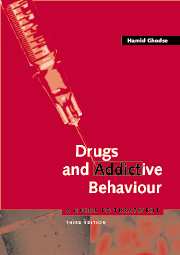Book contents
- Frontmatter
- Contents
- Preface
- Introduction
- 1 Drugs, addiction and behaviour
- 2 Drug dependence in the UK – and elsewhere
- 3 Drugs of abuse and dependence
- 4 Alcohol
- 5 Assessment
- 6 General measures of intervention
- 7 Specific methods of treatment
- 8 Complications of drug abuse and their treatment
- 9 Special problems
- 10 Follow-up and treatment outcome
- 11 Prevention of drug abuse
- 12 The law and drug control policies
- Appendices
- References and further reading
- Index
3 - Drugs of abuse and dependence
Published online by Cambridge University Press: 06 January 2010
- Frontmatter
- Contents
- Preface
- Introduction
- 1 Drugs, addiction and behaviour
- 2 Drug dependence in the UK – and elsewhere
- 3 Drugs of abuse and dependence
- 4 Alcohol
- 5 Assessment
- 6 General measures of intervention
- 7 Specific methods of treatment
- 8 Complications of drug abuse and their treatment
- 9 Special problems
- 10 Follow-up and treatment outcome
- 11 Prevention of drug abuse
- 12 The law and drug control policies
- Appendices
- References and further reading
- Index
Summary
Opioids
The parent drug of this class is opium, obtained from the opium poppy Papaver somniferum, which grows in large areas of South-East Asia and the Middle East (Turkey, Iran, Afghanistan, Pakistan, Myanmar, Thailand, etc.), as well as in other parts of the world (e.g. Poland). After the poppies have bloomed, the unripe seed capsules are incised with a knife and the milky exudate that oozes out is allowed to dry. It becomes a brown, gummy mass which is scraped by hand from the seed capsule. This, dried further and then powdered, is crude opium which may be smoked in special pipes, chewed, or inserted as small pellets into cigarettes. ‘Prepared’ opium is a boiled-down aqueous solution of raw opium, prepared for opium smokers by repeated boiling and filtration to extract all possible opium and to remove all impurities. The final boiling leaves a thick, sticky paste.
Crude opium contains a number of chemical compounds called alkaloids which possess the same or similar properties as opium. The major alkaloids obtained from opium include morphine (10% by weight) and codeine. Traditionally, the term ‘opiates’ was used to describe these naturally occurring substances and the semisynthetic drugs that are derived from them (e.g. diamorphine/heroin) while ‘opioids’ described totally synthetic drugs (e.g. dextromoramide, methadone, pethidine) with similar properties. More recently, with the discovery of so-called opioid receptors that bind all of these drugs, the term ‘opioid’ has come to be used as the collective description of the naturally occurring alkaloids, semisynthetic derivatives and totally synthetic drugs. However, in general usage ‘opiates’ and ‘opioids’ are often used interchangeably.
- Type
- Chapter
- Information
- Drugs and Addictive BehaviourA Guide to Treatment, pp. 95 - 142Publisher: Cambridge University PressPrint publication year: 2002
- 1
- Cited by



